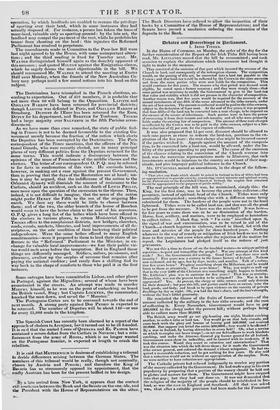The Doctrinaires have triumphed in the French elections, ac- cording
to expectation. Out of 459 members, it is probable that not more than 80 will belong to the Opposition. LAFITTE and °DILLON B tRROT have been returned for provincial districts; though LArirrx was defeated in Paris, and ODILLOIN BARROT at Strasburg. DUPONT de fEure has been returned for the Eure, Deem for his department, and BERRYER for Toulouse. TRIERS had a large majority over SALVERTE in the fifth Parisian arron- dissement.
As we have more than once remarked, the state of public feel- ing in France is not to be deemed favourable to the existing Go- vernment merely because the fraction of the nation which elects the Deputies has been corrupted by the Doctrinaires. The Paris correspondent of the Times mentions, that the officers of the Na- tional Guards, who were recently elected, are in many principal places of very different politics from the Deputies returned for the same towns. This would indicate a discrepancy between the opinions of the mass of Frenchmen of the middle classes and the electors. The letter of our correspondent 0. P. Q. may be referred to for facts in confirmation of this view. He succeeds better, however, in making out a case against the present Government, than in proving that the days of the Restoration are at hand; un- less it may be argued, that the indifference of the nation to the Orleanist dynasty will diminish the amount of resistance to the Carlists, should an accident, such as the death of Louis PHILIP, once more open the question of' the succession to the throne. Then, indeed, it is not difficult to imagine, that the mass of the nation might prefer HENRY the Fifth to the son of the reigning Mo- narch. We dare say there would be little to choose between them; and of the two, the older branch of the house of Bourbon would seem to have the better claim to the seat of his ancestors. 0. P. Q. gives a long list of the bribes which have been offered to the electors in various places, to return Ministerial Deputies. THIERS offers to the complaisant districts, new bridges, churches, roads, canals, markets, libraries, and local improvements of all de- scriptions, on the sole condition of their bartering their political independence. Were the same bribes offered to many English constituencies—were it proposed to them to lend their share of in- fluence in the "Reformed" Parliament to the Minister, in ex- change for valuable local improvements—we fear their public vir- tue would melt away before the temptation. But in England these things are differently managed. Soldiers, sailors, pensioners, and placemen, swallow up the surplus of revenue that remains after paying the national creditor; and rarely does a shilling find its way back in the shape of comforts to those who paid it in the first instance.






















 Previous page
Previous page